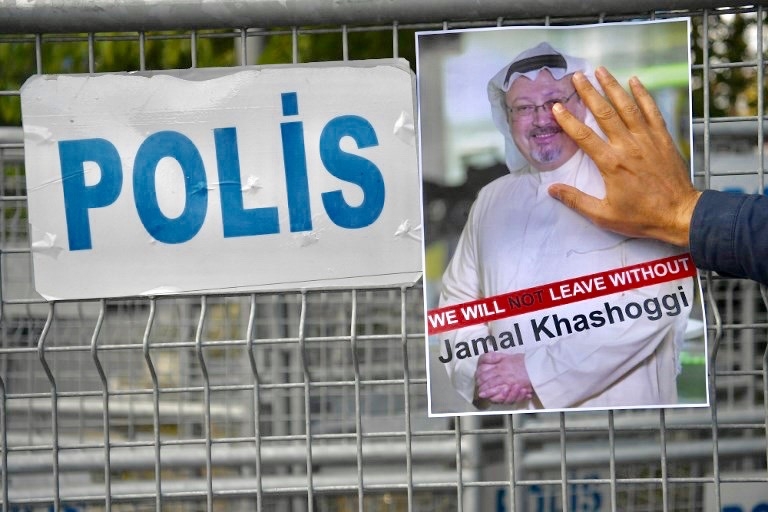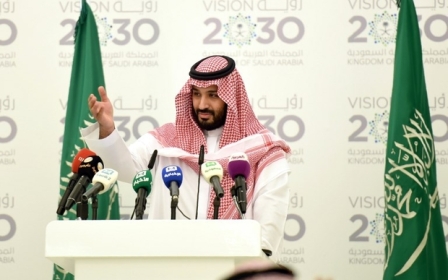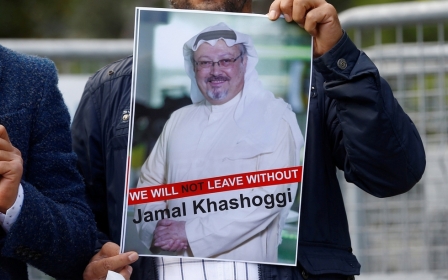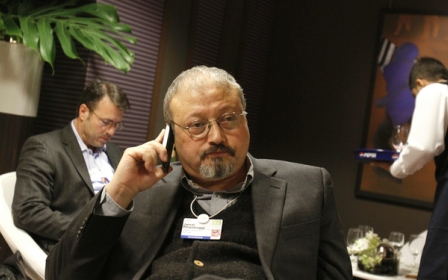Turkish police suspect Saudi journalist Khashoggi was killed at consulate

Turkish authorities suspect that missing Saudi journalist Jamal Khashoggi, who disappeared on Tuesday after entering Saudi Arabia's consulate in Istanbul, was killed inside the consulate, Turkish sources told Middle East Eye and news agencies on Saturday.
A senior Turkish police source told MEE that police believed that Khashoggi, a prominent critic of the Saudi government, was "brutally tortured, killed and cut into pieces" inside the consulate after visiting the building on 2 October.
"Everything was videotaped to prove the mission had been accomplished and the tape was taken out of the country," the source said.
An unnamed Turkish official told the Reuters news agency that Turkish police believed Khashoggi had been killed and his body then removed from the building.
"The initial assessment of the Turkish police is that Mr Khashoggi has been killed at the consulate of Saudi Arabia in Istanbul. We believe that the murder was premeditated and the body was subsequently moved out of the consulate," said the official.
Yasin Aktay, a former MP for Turkey's ruling AK (Justice and Development) party and the man Khashoggi told his fiancee to call if he did not emerge from the consulate, said Turkish authorities had "concrete information" regarding the matter.
Speaking to CNN Turk on Sunday, Aktay, an adviser to Turkish President Recep Tayyip Erdogan, said: "Khashoggi discussed to go there or not with his fiancee beforehand.
"Our security officials are investigating the issue in every detail. We have some concrete information, it won't be an unresolved crime.
"We could determine his entrance but not any exit. That's confirmed. We asked them [the Saudis], they say 'he left,' but there is no such thing on the camera footage.
"That's underestimating Turkey. They are wrong if they think Turkey is as it was in the 90s. The consulate should make a clear statement."
Aktay said he believed Khashoggi had been killed in the consulate and that Turkish authorities believed a group of 15 Saudi nationals were "most certainly involved" in the matter.
Police said about 15 Saudis, including officials, came to Istanbul on two private flights on Tuesday and were at the consulate at the same time as the journalist. They left again the same day, according to MEE's sources.
Their diplomatic bags could not be opened, a security source told MEE, but Turkish intelligence was sure that Khashoggi's remains were not in them.
An unnamed official from the Saudi consulate in Istanbul dismissed the claim on Sunday, describing the allegations to the Saudi Press Agency as "baseless".
MBS says 'nothing to hide'
Saudi Crown Prince Mohammed bin Salman told Bloomberg in an interview on Friday that Turkish authorities could search their consulate, as they had "nothing to hide". He added that Khashoggi had left the building not long after he entered.
Some Reuters journalists toured the facility on Saturday, but Turkish authorities had not entered it.
Another police source told MEE on Saturday: "The consulate is surrounded by cameras, no evidence of Khashoggi leaving was recorded on them."
The Washington Post, which on Friday ran a blank space on its opinion page to draw attention to Khashoggi's disappearance, said on Saturday the killing, if confirmed, "would mark a stunning escalation of Saudi Arabia's effort to silence dissent".
"If the reports of Jamal's murder are true, it is a monstrous and unfathomable act," Fred Hiatt, director of the Post's editorial page, said in a statement.
"Jamal was - or, as we hope, is - a committed, courageous journalist. He writes out of a sense of love for his country and deep faith in human dignity and freedom. He is respected in his country, in the Middle East and throughout the world. We have been enormously proud to publish his writings."
Speaking to MEE, Basheer Nafi, the Palestinian thinker and writer who knows Khashoggi, said: "I've seen hundreds and thousands of Saudis in my life.
"I've never seen a man more gentle and more decent than him ... He doesn't deserve to be treated like this at all."
The Post also cited a senior US government official as saying that Washington is not aware of Khashoggi's whereabouts and cannot confirm the reports about his murder.
Bruce Reidel, a former CIA analyst and director of the Brookings Intelligence Project at the Brookings Institute, told MEE: "I'm not surprised. The crown prince does not tolerate criticism. And he knows [US President Donald] Trump won't care.
"Perhaps some of MBS's naive boosters in the West will finally see he is no revolutionary or reformer, but the president has his back."
Speaking to MEE on Sunday, Sarah Leah Whitson, Middle East director of Human Rights Watch, called the reported killing of Khashoggi a "shocking act" that is a part of a "pattern of unlawful abductions" by the Saudi government.
"The message that the crown prince is trying to send to people who think independently, any Saudi Arabian who thinks independently, is that: 'We are going to find you. We're going to find you inside our country. We're going to find you outside our country. No one can stop us.'
"That's a deliberate effort to make Saudis feel afraid," she said.
'I am raising my voice'
Khashoggi disappeared after visiting his country’s consulate on Tuesday, his fiancee told Middle East Eye.
"He entered at 1pm and hasn't surfaced since then. I have no media statements to make at this point, but I have contacted Turkish authorities for help," Khashoggi's fiancee, who did not want to be identified by name, told MEE by phone.
According to the fiancee, Khashoggi visited the Saudi consulate in Istanbul last week but was asked to return on Tuesday to complete an application related to family matters.
According to a friend of Khashoggi who spoke to MEE on condition of anonymity, the journalist's Saudi wife divorced him after he fell out with the Saudi authorities. He was visiting the Istanbul consulate to obtain proof of his divorce required by Turkish authorities to marry his fiancee.
Khashoggi is a former editor-in-chief of Saudi newspapers al-Arab and Watan. He previously served as the media adviser to Prince Turki al-Faisal during his tenure as ambassador in London and Washington.
The seasoned journalist studied at Indiana State University and has been based in Washington DC since he fled Saudi Arabia in 2017 over fears of the new government's crackdown on critical voices.
Khashoggi is considered a Saudi nationalist, and before leaving Saudi Arabia in September 2017 he was seen as close to the royal court.
Friction between him and the kingdom's rulers began to emerge after comments at the Washington Institute for Near Eastern Policy, warning that Saudi Arabia should be "rightfully nervous about a Trump presidency".
Authorities soon after informed him that he was banned from writing and tweeting. Worried by the actions, Khashoggi decided to leave the country.
Since then, he has primarily been living in the US capital, writing for the Washington Post. His columns include criticism of Saudi Arabia's policies towards Qatar and Canada, the war in Yemen, and a crackdown on the media and activists.
"I have left my home, my family and my job, and I am raising my voice," he wrote in September 2017. "To do otherwise would betray those who languish in prison. I can speak when so many cannot."
Khashoggi's fiance tweeted in Arabic late on Saturday: "Jamal was not killed, and I don't believe that he was killed."
New MEE newsletter: Jerusalem Dispatch
Sign up to get the latest insights and analysis on Israel-Palestine, alongside Turkey Unpacked and other MEE newsletters
Middle East Eye delivers independent and unrivalled coverage and analysis of the Middle East, North Africa and beyond. To learn more about republishing this content and the associated fees, please fill out this form. More about MEE can be found here.




